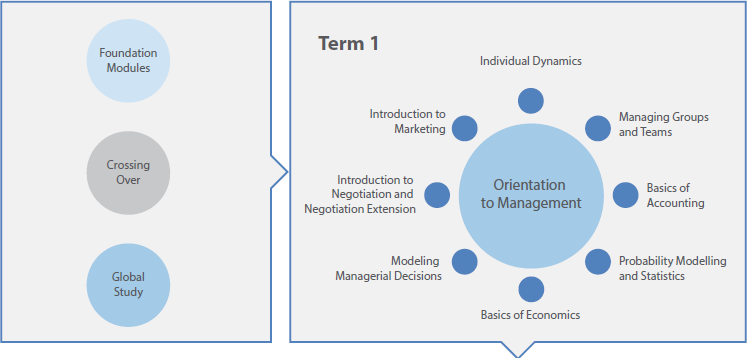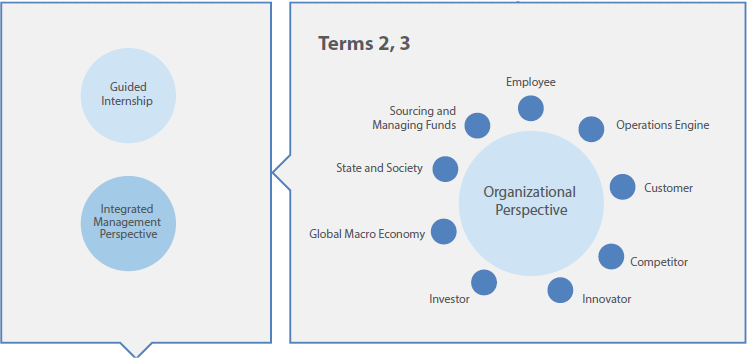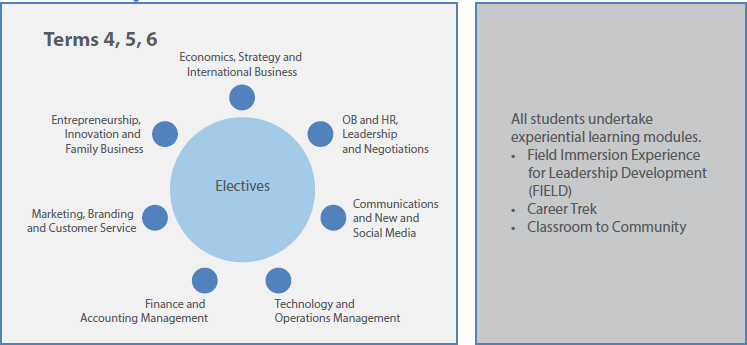The curriculum at IILM imbibes the best aspects of courses offered at top business schools around the world. The modules are inspired by the Wharton Business School, the Harvard Business School, the Yale School of Management and the IIMs. They aim at combining theory with practical training so that students are capable of turning concepts into understanding, knowledge into action and ideas into innovation. With curriculum bench-marked against the best in the world, the IILM PGDM goes beyond Finance, Marketing, OB-HR, and Operations. We have Field Courses (as at Harvard), Career Trek (as at Wharton) and Community Experience (as given at Yale). The program is delivered in 6 terms; each term spread over 3 calendar months. In the two years of the PGDM Program, the students are exposed to modules which give them an Orientation to Management (Term 1), Organisational Perspective (Term 2) and Integrated Management Perspective. In the first year of the Program, students imbibe foundation concepts and building blocks of management.

Orientation to Management
A series of foundation courses aimed at teaching skills and language required in any career in business and management. The modules in Term 1 include Basics of Accounting, Basics of Economics, Probability Modeling and Statistics, Individual Dynamics, Managing Groups and Teams, Modeling Managerial Decisions, and Negotiation skills.

Organizational Perspective
Courses that look at how organizations really work with their many constituencies are dealt with in the Organizational Perspective. These courses teach what students need to know to lead a thriving organization. Many of the class sessions are team taught by faculty who bring diverse perspectives to the questions under discussion. Modules discussed in Term 2 include Customer, Employee, Innovator, Competitor and Investor.
Integrated Management Perspective
After the students learn the nuances of analyzing data, working in teams, how organizations thrive, big trends in the global marketplace, they need to put it all together. The Integrated Management Perspective looks at real organizational dilemmas and the complex challenges involved in leading a contemporary business.
Summer Internship Programme
Students undertake eight-twelve week summer internship after the completion of first year with any organization in their preferred area of specialization. The objective of SIP is to help the students relate to the concepts learnt in the class to real life situations, make them more aware of business practices and instill a sense of discipline. It is a mandatory training for all students and is equivalent to two full courses.
Workshops
A series of workshop are offered in every term in order to supplement classroom teaching and enhance various skills and learning of students. Through these workshops we aim to prepare the students for the corporate world and help them achieve their goals of better employment.
Industry Visits / Live Project
As a part of integrated learning process, the students take up live projects with corporates and NGOs in and around Delhi which serve as a platform to put classroom learning into practice.

Experiential Learning
Our curriculum provides for experiential learning through Field Immersion Experiences for Leadership Development (FIELD), Career Trek and Classroom to Community. The FIELD module is divided into 3 parts. FIELD 1 aims at improving the students’ teamwork and leadership skills. Students understand the dynamics of working in teams and how individual performance affects overall team performance. FIELD 2 reiterates team building skills while instilling problem solving and presentation skills in the students. Lastly, FIELD 3 works on formulating a business plan in order to make learning more practical and engaging for a microbusiness of a new product/ service idea. Career Trek requires students travelling to different parts of the country to interact with the HR personnel of reputed organizations, to gain first hand understanding of job skills required for various industries. This enables students to plan their career paths. Classroom to Community involves students taking up opportunities to work in social enterprises and NGOs and putting to use various business tools and techniques. They experience the flavour of community service by working in various parts of the country.
Electives
The second year offers a choice of a number of electives in a range of areas that provide for specialization. As many as 80 different courses are offered as electives, and fall into one of the following sub-areas:
- Economics,Strategy and International Business
- OB and HR, Leadership and Negotiations
- Communications and New and Social Media
- Technology and Operations Management
- Finance and Accounting Management
- Marketing, Branding and Customer Service
- Entrepreneurship, Innovation and Family Business.

